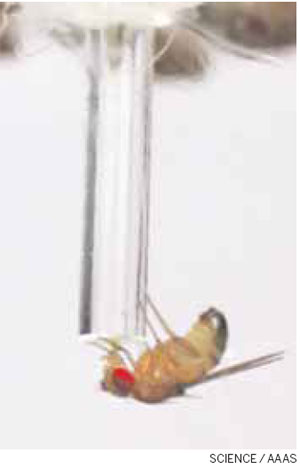Pills on the mind
Updated: 2012-05-28 15:17
(The New York Times)
|
|||||||||||
 |
|
Researchers hope studies on fruit flies lead to a drug for alcohol abuse. |
When a study posted online by the journal Science back in March revealed that male fruit flies resorted to alcohol after being rejected by attractive females, an entire gender nodded in recognition.
Evolutionary scientists say the results suggest that elements of the brain's reward system have changed very little over eons.
"Reading this study is like looking back in time, to see the very origins of the reward circuit that drives fundamental behaviors like sex, eating and sleeping," Dr. Markus Heilig, the director of the National Institute on Alcohol Abuse and Alcoholism, told The Times.
Researchers at the University of California, San Francisco, had allowed male fruit flies to mate with virgin females. A separate group of males were exposed to females that had already mated, so were uninterested in sex. The fruit flies that were spurned drank heavily, sipping from mixture spiked with alcohol at a rate far higher than their sated peers, The Times reported.
Dr. Heilig, who was not involved in the fruit fly study, told The Times the findings supported the effort to develop drugs aimed at reducing the urge to drink among humans by stimulating brain chemicals.
Scientists have also identified drugs that may be able to treat the buildup of proteins in the brain that cause degenerative diseases in the nerve centers of the frontal and temporal lobes - the home of decision-making, emotion, judgment, behavior and language, The Times reported.
Frontotemporal dementia, or Pick's disease, can cause loved ones to act in ways that are unrecognizable and are routinely misdiagnosed as Alzheimer's, stroke, midlife crisis or psychiatric illnesses, The Times reported. Many relatives of patients say doctors attribute the altered behavior to a mere personality change.

"The frontal lobes are sort of the last frontier in the brain," Dr. Edward Huey, an assistant professor of psychiatry and neurology at Columbia University Medical Center, told The Times. For instance, these patients have compulsions, like hand washing, but not in a worried or anxious way as an obsessive compulsive person would. Some lose their inhibitions and moral judgment.
"They're not down, but they just don't enjoy things as much as they used to," Dr. Huey told The Times. "There appears to be a dysfunction in the reward circuit."
Alcohol addiction and the buildup of brain proteins are physiological problems that may be treated with new compounds. But what about moral behavior? Should we search for drugs to "cure" behavior that violates moral standards?
Peter Singer and Agata Sagan, writing in The Times, said the understanding of what governs moral behavior was still murky. They ask: "Why are some people prepared to risk their lives to help a stranger when others won't even stop to dial an emergency number?"
They suggest that research may show biochemical differences between the two types and that there may one day be a "morality pill" to prevent criminal behavior, or just to make us better citizens.
"The idea is not far-fetched," the pair wrote. "If so, would people choose to take it?"
Related Stories
Spotlight shines on rare diseases 2012-02-29 10:33
Fatty liver disease more common 2011-11-30 13:31
Finding hope, escaping clutches of 'that disease' 2011-08-10 09:59
Killer disease feeds on fast-food lifestyles 2011-02-11 07:29
Today's Top News
Rescuers race against time for quake victims
Telecom workers restore links
Coal mine blast kills 18 in Jilin
Intl scholarship puts China on the map
More bird flu patients discharged
Gold loses sheen, but still a safe bet
US 'turns blind eye to human rights'
Telecom workers restore links
Hot Topics
Lunar probe , China growth forecasts, Emission rules get tougher, China seen through 'colored lens', International board,
Editor's Picks

|

|

|

|

|

|





